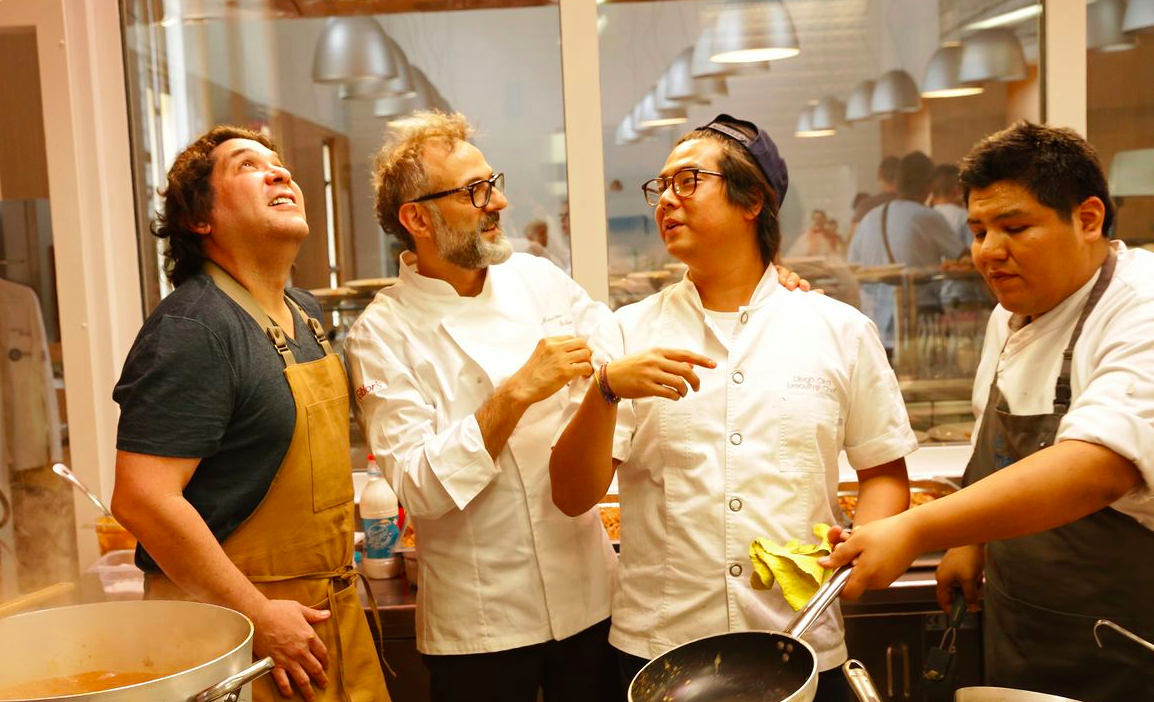You’d be surprised by the amount of food that an Olympic athlete can put away, but the chefs chosen to prepare food in the Olympic Village have a pretty good idea of how much is needed to serve over 11,500 of them, plus their coaches and trainers. One meal alone contains over 250 tons of raw ingredients, and for the chefs in charge of preparing the meals, running out of food is not an option. Breakfast, lunch, dinner and snacks are prepared around the clock, and always in excess, which results to tons of wasted food in Rio, a city with one of the world’s most extreme monetary gaps in the world.
Massimo Bottura, head chef of the three Michelin-star restaurant Osteria Francescana, saw this situation as a unique opportunity to turn what would be a terrible waste of food and sustenance into an opportunity to give back to the Rio community. He, alongside his partner, Brazilian chef David Hertz, recruited some of the world’s most celebrated cooks, like Monacan chef Alain Ducasse, Spanish chef Joan Roca and over 40 others to come together in Rio to form Refettorio Satromotiva, a dining hall that uses the discarded and would-be-wasted ingredients and leftovers from the Olympic Village to prepare and serve some of the world’s finest cuisine to some of the poorest families in the city.
Located in Lapa, one of Rio’s poorest neighborhoods, the Refettorio Satromotiva is a direct contrast to the indulgent, over-priced and high-brow feasts and parties that have been taking place around the country since the beginning of the games in August. The restaurant offers paid lunch, generally frequented by tourists, to cover the cost of the 108 free dinners each night to those in need.
Menu items have included dishes like Italian couscous with sautéed beef and panzanella, mole chicken, tomato, beetroot and mozzarella appetizers and lemongrass sorbet. Oftentimes, these dishes are constructed with food deemed “inadequate” for Olympic athletes, and would be wasted without a second thought. On the Refettorio’s opening day, the food sent over was so much that Botturo and his team didn’t have the resources to prepare it all. Whatever they didn’t use was sent to distribute to poor communities in the city. Thanks to the Refettorio, the waste is transformed and served back to the community – a community that has suffered greatly since the country began preparing for the Olympic games over 3 years ago.
For Bottura however, the goal of the Refettorio was not only to provide a good dead to the community, but also to send a message to the Brazilian government and the world, comparing the wasteful and lavish tendencies of the wealthy to the needs and disadvantages of the poor all living in the same city.
Bottura and Hertz fundraised over $250,000 dollars to lease the land and construct the Refettorio leading up to the games, and have no intention of letting this be what he calls a temporary “pop-up project.” Instead, they imagine the Refettorio, which transforms wasted ingredients into meals for the poor, as something that can self-sustain and remain a functioning establishment, feeding numerous impoverished Brazilians in the years to follow.
“This is not a charity, it’s not about feeding people… This is about social inclusion, teaching people about food waste and giving hope to people who have lost it.”
Bottura, in addition to running one of the world’s most renowned restaurants, has been known before this for opening charitable dining experiences in the past. During the World Expo in Milan in 2015, Bottura transformed an abandoned building outside the city’s downtown into a similarly-ran Refettorio Ambrosiano. The restaurant continues to run and operate today. His partner David Hertz is known for his nonprofit, Gastromotiva, which helps train thousands of impoverished Brazilians to work as kitchen assistants in schools across Brazil, with new branches opening in Mexico City and South Africa.

